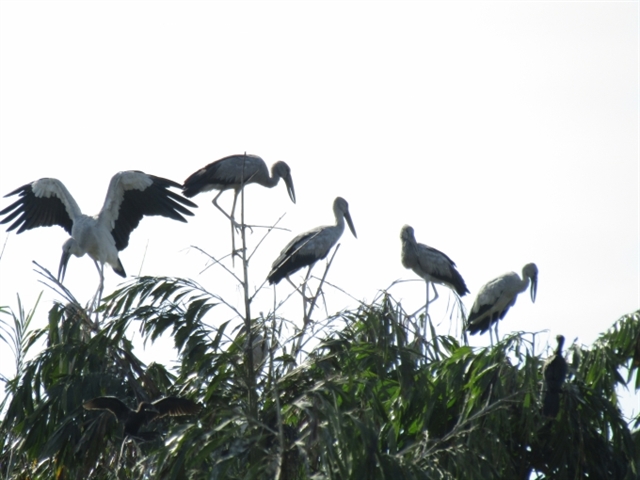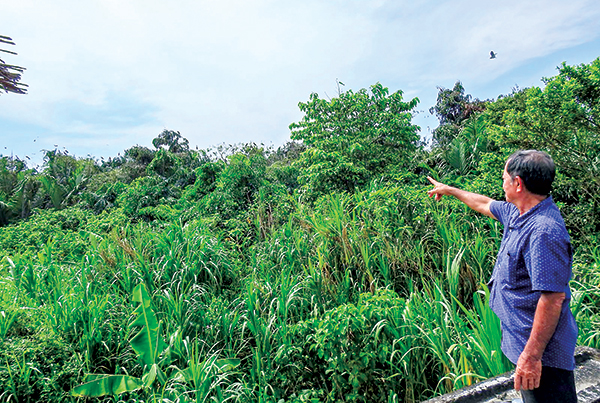 Environment
Environment

His family has suffered economic losses to provide safe shelter for birds as they had no earnings from the garden.

|
| Cò nhạn (a kind of openbill stork with the scientific name Anastomus Oscitans) nest on bamboo branches on Lê Văn Chìa’s garden in Vĩnh Long Province’s Trà Ôn District. — Photo nongnghiep.vn |
VĨNH LONG — While it is said that “land is as precious as gold”, a 74-year-old farmer has decided to leave 20,000sq.m of land alone to give storks a home to nest and lay eggs.
Lê Văn Chìa, a resident from Tân Mỹ Commune in Vĩnh Long Province’s Trà Ôn District, has been called crazy for forgoing profit from the land over the past 14 years.
“It was in 2006 when dozens of black-crowned night-herons appeared in my garden. I thought that they would take a rest and then fly away. However, they didn’t and the bird population started increasing,” Chìa recalled.
“After seeing flocks of birds settling here, we decided to do something to help them stay longer and protect them,” he said, adding that he planted cajeput trees so the birds could nest.
The land, covered with various kinds of plants, turns white when storks and other types of birds Asian Koel land every afternoon.
His family has suffered economic losses to provide safe shelter for birds as they had no earnings from the garden.
At first, the herons nested on longan trees, which reduced the yield of a tree by 20-30 per cent. As time went by, the number of flocks of storks and other birds that arrived at the garden increased, leaving the garden filled with longan trees completely damaged.
“In the old days, when a flock of birds didn’t settle here, the income from longan and mangosteen trees was enough for the family to make ends meet and their children’s schooling.
“Because of this flock of birds, my family lost hundreds of millions đồng per year just to keep them peaceful,” he was quoted by Nông Nghiệp Việt Nam (Việt Nam Agriculture) online newspaper.
Chìa said many people have advised him to catch the birds and sell them to ease his family’s hardship but he refused to do so.
“Although I am poor, I never think of selling them for money.”
In addition to guarding the birds against hunters, he also seek food for them as they were his children.
“Whenever I have free time in the morning, I manage to collect fish and shrimp for food for my family as well as for the birds.”
Chìa said that he understood the birds so well that he knew exactly when each kind of bird would leave and their customs.
Challenges
From the day Chìa turned his orchard garden into a resettlement for birds, his life seemed to get harder.
He has to watch day and night because some people would try and sneak in to steal the baby birds or shoot the adults.

|
| Lê Văn Chìa points out the location of several kind of birds in his garden. — Photo baocantho.com.vn |
To prevent bird poachers, Chìa put many traps in the garden using cans of milk or beer.
When the thief steps into a trap, there would be a sound that will alert the bird to fly away or Chìa to come help.
If he finds any birds injured by poachers, he takes them home and cares for them until they are fully recovered.
In his experience, if an intruder enters the garden, the birds will immediately "call for help".
Chìa said he hasn’t slept well for years.
Lê Thị Thời, 73, Chìa’s wife, said: “At night, upon listening to the sound of the storks and black-crowned night-heron, he takes a light and goes on patrol regardless of the weather to check for poachers.”
Every night, he sleeps in a tent up near the garden to protect the birds even when she has just been discharged from the hospital, Thời said.
Chìa said he had to face illegal hunters many times but one incident stands out.
“I encountered two thieves on that night. Hearing the birds sound, I went out of the tent and saw one man run away. The other man, who was clinging to a tree, immediately shot at me.”
He was lucky because it just made a hole in a helmet he was wearing, he said, adding that “without the helmet, I might have been injured in the incident".
He hopes to receive financial support to erect a fence to prevent hunters from entering the garden to steal the birds.
According to Chìa, his biggest concern is seeking assistance from relevant agencies to preserve the up to 13,000 birds. Of these, 4,000 are cò nhạn (a kind of openbill stork). The stork is listed as rare in the Việt Nam Red Book.
“Now I’m healthy and still able to protect the birds but I don't know how long it will last.”
Now as he's getting old and less active, one question haunts his mind: who will protect the birds when he's gone? — VNS




